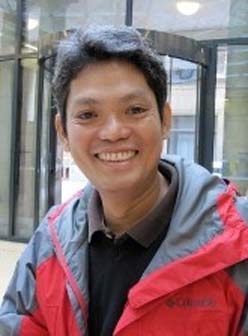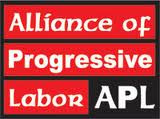
“Currently workers are under tremendous pressure due to the precariousness of work which has seriously effected their ability to organize.
“Thirty years since the fall of the Marcos regime, workers are still being hunted down like criminals by the state – subject to massive trade union repression, particularly during the Arroyo administration,” Joshua explains. The effects of neoliberal restructuring are still being felt in the Philippines.
For example, in the southern island of Mindanao security militia are intimidating workers from garment factories who try to organize.
“Many leaders have received visits from military intelligence operatives, threatening their wives or husbands. And it is not just in Mindanao, it happens a lot anywhere outside metro Manila.”
Workers are often warned about being ‘communists’, and so far, a labour rights movement has been struggling to develop.
Red-baiting has also re-emerged as a standard tactic of the government.
“Because of the restructuring, employers are driven to undermine workers, but the problem is also because of the informalization of work,” says Joshua.
Many of the companies employing temporary workers are jointly operated foreign-Filipino ventures, particularly with Japanese, American, South Korean and Chinese companies. As a result of neoliberal globalization, the Philippines, like many other countries has undergone massive industrialization, and informal or temporary employment has outstripped the amount of formal work, putting millions into a perpetual state of insecurity.
“This was the case in all the manufacturing industries,” Joshua says. Although already as a result of neoliberal globalization, communities have also been impacted by industrial decline, as businesses in the Philippines fail to compete with stronger regional competitors, like China. For example, the metal industry which was devastated by cheap imports from Russia and China.
“We also lost our shoe manufacturing industry which caused massive insecurity because of intensified competition through trade liberalisation,” says Joshua.
Part of the problem is structural and related to the export-oriented development programme of the government which uses the mantra of competitiveness. However, while part of the pressure is structural, it also provides an excuse for employers to exploit workers.
The effect of temporary work on people is devastating, especially for youth, who are the hardest hit. Having their survival tied to only 3 month contracts means they can never plan or build lives, families and communities. As a result of the temporization of work, the poverty level has risen significantly, especially in sprawling urban poor communities. There are a lot of health problems (less that 1 percent of the national budget is spent on health care); there is limited access for most people to medicine and children cannot attend school – further limiting their chances to secure work when they are young adults.
In Manila, there is a stark division between rich and poor. Rich enclaves are completely shut off from down town Manila where the reality for most people is clear on the streets. There you see whole families and communities, from young parents with new born babies to elderly women, living on the pavement. In the rich areas, the poor are cleared away by the local government. This also involves a security dimension.
Many cities, especially in the south of the Philippines, are highly militarised. Although people’s movements succeeded in removing a number of permanent US military bases, they are back, in their own ‘temporary structure’ – referred to as ‘lilipads’. These are essentially US military bases, but they are ‘floating’ in the sense that they set up a temporary site and then move to another. Although the foreign military presence is shifting, it is ever present. The US bases are involved in training Filipino elite forces. There have even been reports that militia had used ‘live targets’ – often dismissed as ‘terrorists’ in their tactical training.
Joshua explains that the labour code in the Philippines is the only law which has remained the same since the Marcos era. Overnight, the revolutionary government redrafted all the country’s laws, but this one was left intact. In fact, under Aquino, it was even amended to make workers rights even more restricted. APL and other labour movements have been fighting to change this law for a long time. After 9 years of struggle, it was finally amended, but then another law was introduced which immediately undermined it.
“The APL focuses on organizing workers so they have the collective capacity to fight for better policies, ones that respect the rights and dignity of workers. However, this is only one part of the goal. APL is also concerned about lobbying for structural change, and a redefinition of development.”
APL tries to organise formal and informal workers, as well as migrant workers.
The Philippines has the greatest number of overseas migrant workers – 10 percent of the country’s population. Many of them are unskilled, domestic workers and women, but there are also a large number of sailors, dock workers and nurses working overseas.
APL also aims to use forums like the AEPF to help it build a transnational network of trade union and labour organizations, across Asia and Europe and the globe, to help fight against free trade agreements (FTAs), which have negative impacts on all. “This,” said Joshua, “is especially hard in Asia because the unions are very weak. Some are even state controlled or they are too close to business, even in the Philippines.”
Their work also involves popular education among workers. Sadly, while trade has a massive impact on the lives of the working people, the truth is many of the workers have yet to make the link between their poverty and insecurity, and the FTAs. Most people have no spare energy to focus on issues beyond their immediate survival. “When this is so difficult, how can they be concerned about international politics?” asked Joshua. However, APL had quite some success through an initiative to educate and mobilise workers in opposition to the Japan FTA.
“It is very hard to expect much from the governments of Europe and Asia, because none of them are really democratic. But, having said that, I think if ASEM8 [Asia-Europe Meeting] really wants to be relevant to the lives of the working class then I would like to see them roll back the neoliberal project that many governments have instituted in their own countries, and enable workers to organize more effectively.”
“It’s not really a regional block,” said Joshua, “it doesn’t operate as such. It was founded as a bulwark against communism. Then at the end of Cold War – it became a body that had to search for rationale; so trade is its new thing.”
ASEAN has a charter, “says Joshua, “but to develop the institutions and the culture of working together is much more difficult, and most ASEAN countries just do their own thing and focus on bi-lateral agreements.”
“China deals bilaterally with each of the others,” said Joshua, and “the EU deals individually with ASEAN members, so that it could avoid controversy of including Burma, against which it has sanctions, in its negotiations. This also invalidates the union.”
Also, Joshua added, most of the people negotiating these free trade agreements are not elected. “For example, the Japan Partnership Agreement with the Philippines was secretly negotiated – and it actually violated the constitution! This had been blocked for 2 years, but in the end the Senate voted for it. Because Japan is a biggest source of foreign direct investment.”
 This article is reprinted from Transnational Institute, November 2010 at
http://www.tni.org/article/activists-across-asia-explain-how-eu’s-free-trade-agenda-affects-them-3-labour-rights-phili-0
This article is reprinted from Transnational Institute, November 2010 at
http://www.tni.org/article/activists-across-asia-explain-how-eu’s-free-trade-agenda-affects-them-3-labour-rights-phili-0 Alliance of Progressive Labor,
Alliance of Progressive Labor,
 Home | Aims and Objectives of Solidarity Philippines Australia Network | About Kasama
Home | Aims and Objectives of Solidarity Philippines Australia Network | About Kasama 
Search the SPAN Web